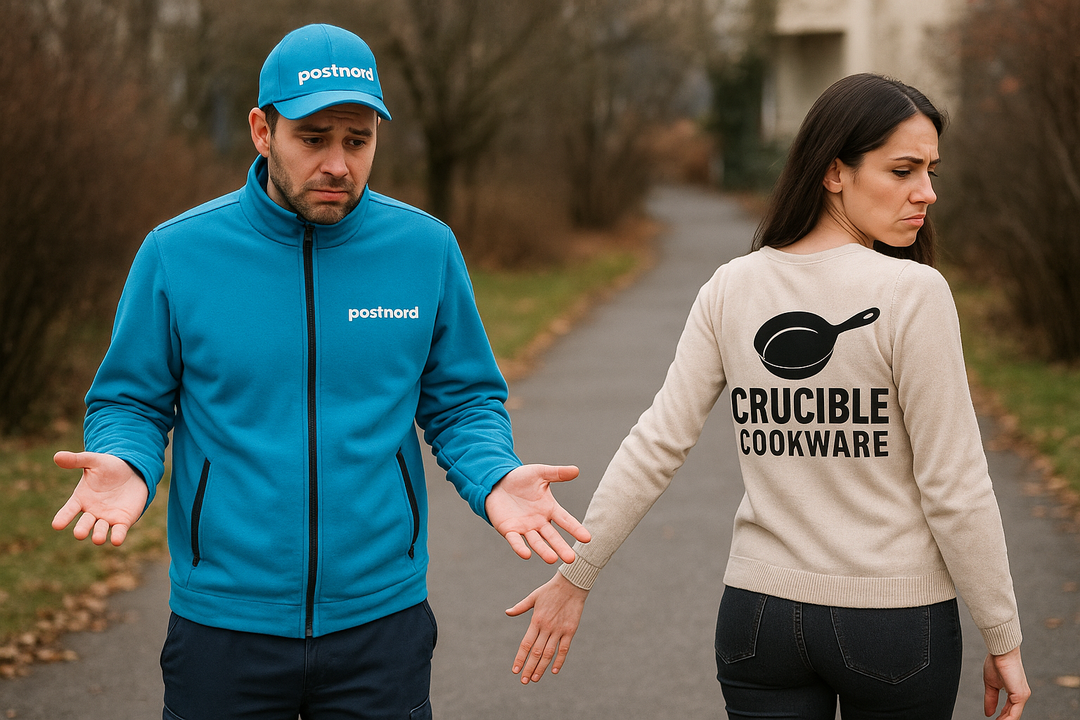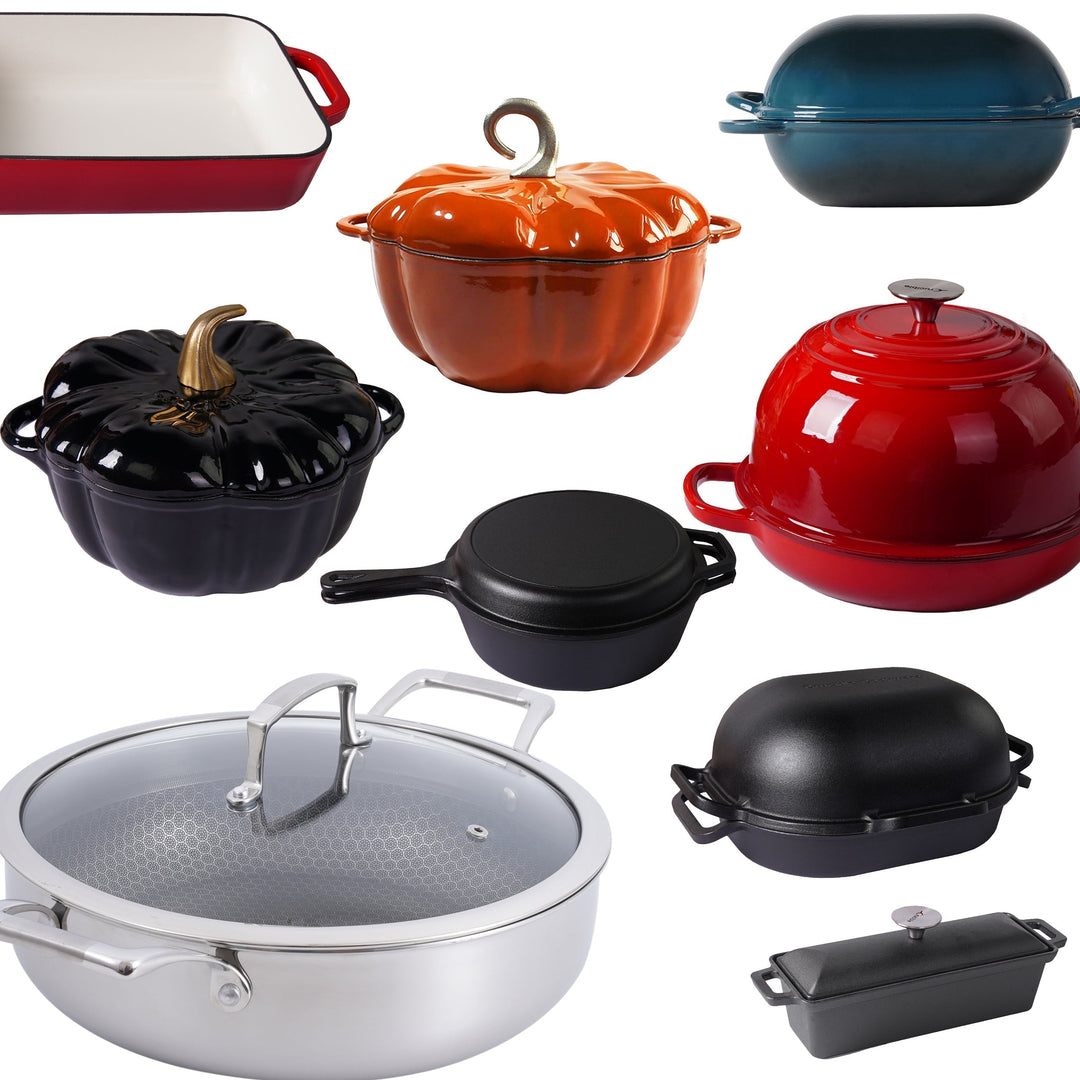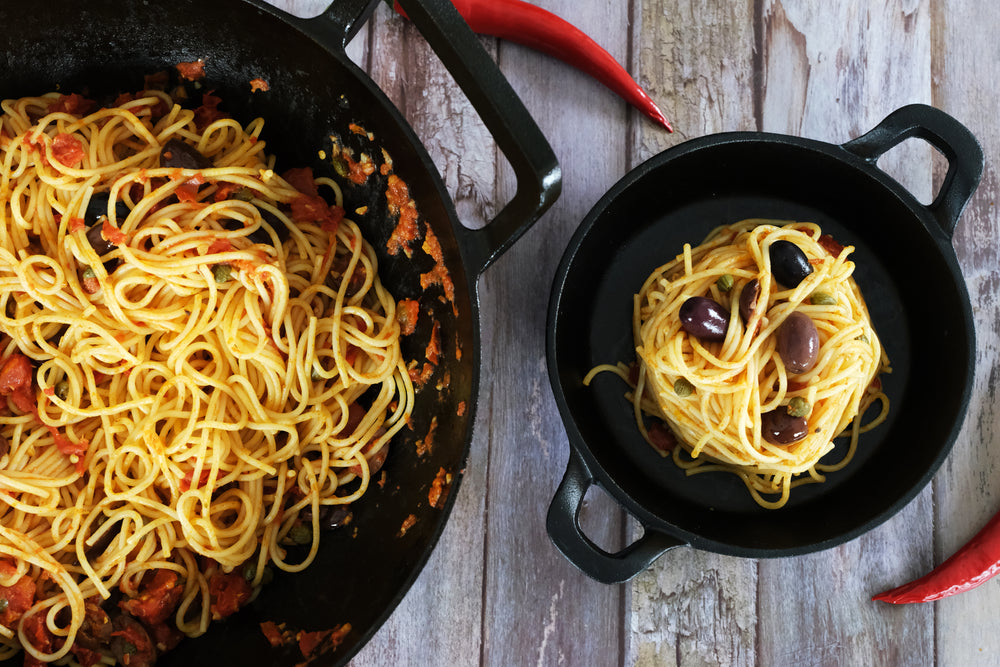Η επιστήμη του χυτοσιδήρου: Γιατί είναι το καλύτερο σκεύος μαγειρικής για διατήρηση της θερμότητας και ομοιόμορφο μαγείρεμα

Το cast iron cookware είναι βασικό στοιχείο της κουζίνας για αιώνες, αγαπητό για την ανθεκτικότητά του, την ευελιξία του και την ικανότητά του να κάνει ακόμα και τα πιο απλά γεύματα να έχουν εξαιρετική γεύση. Αλλά τι κάνει το cast iron cookware τόσο ξεχωριστό; Πέρα από την παραδοσιακή του γοητεία, η επιστήμη πίσω από την απόδοση του cast iron αποκαλύπτει γιατί είναι ένα από τα καλύτερα υλικά για μαγείρεμα.
Στην Crucible Cookware, πιστεύουμε ότι η κατανόηση της επιστήμης των εργαλείων σας μπορεί να αναβαθμίσει το μαγείρεμά σας. Ας δούμε γιατί το cast iron είναι η απόλυτη επιλογή για διατήρηση θερμότητας και ομοιόμορφο μαγείρεμα.
Κατανόηση της Διατήρησης της Θερμότητας
Ένα από τα καθοριστικά χαρακτηριστικά του cast iron cookware είναι η εξαιρετική διατήρηση της θερμότητας. Σε αντίθεση με άλλα υλικά μαγειρικής, το cast iron κρατά τη θερμότητα απίστευτα καλά, που είναι ένας βασικός λόγος για τον οποίο είναι τόσο αποτελεσματικό στο μαγείρεμα.
Γιατί το Cast Iron Διατηρεί Τη Θερμότητα Τόσο Καλά
Το cast iron είναι πυκνό και βαρύ, που σημαίνει ότι έχει πολύ μεγαλύτερη θερμική μάζα από υλικά όπως το αλουμίνιο ή το ανοξείδωτο ατσάλι. Η θερμική μάζα αναφέρεται στην ικανότητα ενός υλικού να απορροφά και να αποθηκεύει θερμότητα. Το cast iron απορροφά τη θερμότητα αργά αλλά την κρατάει περισσότερο, επιτρέποντάς του να διατηρεί μια σταθερή θερμοκρασία ακόμα και όταν η πηγή θερμότητας μεταβάλλεται.
Αυτό σημαίνει ότι μόλις το τηγάνι cast iron φτάσει στην επιθυμητή θερμοκρασία, παραμένει ζεστό—ιδανικό για καψάλισμα, τηγάνισμα και ρόδισμα. Είτε μαγειρεύετε ένα παχύ μπριζόλα είτε σιγοβράζετε ένα στιφάδο, η θερμότητα παραμένει σταθερή, εξασφαλίζοντας συνεπή αποτελέσματα σε όλη τη διάρκεια του μαγειρέματος.

Ομοιόμορφο Μαγείρεμα: Χωρίς Ζεστά Σημεία
Η ικανότητα του cast iron να διανέμει τη θερμότητα ομοιόμορφα είναι ένας ακόμα λόγος που εκτιμάται τόσο πολύ στην κουζίνα. Σε αντίθεση με τα λεπτότερα υλικά που μπορεί να δημιουργούν ζεστά σημεία, το cast iron θερμαίνεται ομοιόμορφα σε όλη την επιφάνειά του, προσφέροντάς σας ομοιόμορφο μαγείρεμα κάθε φορά. Είτε μαγειρεύετε σε εστία είτε σε ανοιχτή φωτιά, μπορείτε να εμπιστευτείτε ότι το φαγητό σας θα μαγειρευτεί ομοιόμορφα, χωρίς περιοχές που είναι υπερμαγειρεμένες ή υπομαγειρεμένες.
Ανθεκτικότητα & Μακροζωία
Το cast iron είναι γνωστό για το σχεδόν αδιάλυτο του. Με σωστή συντήρηση, ένα τηγάνι cast iron μπορεί να διαρκέσει για γενιές, και σε πολλές περιπτώσεις, τα σκεύη που περνούν από γενιά σε γενιά έχουν μόνο βελτιωθεί με τον χρόνο. Αλλά τι κάνει το cast iron τόσο ανθεκτικό;
Σκληρό & Ανθεκτικό
Το cast iron είναι φτιαγμένο από ένα μείγμα σιδήρου και άνθρακα, καθιστώντας το ένα από τα πιο ανθεκτικά υλικά που χρησιμοποιούνται στα σκεύη μαγειρικής. Έχει σχεδιαστεί να αντέχει σε υψηλή θερμότητα, άμεση φλόγα και έντονη φθορά. Ενώ τα ελαφρύτερα τηγάνια μπορεί να παραμορφωθούν, να βαθύνουν ή να φθαρούν με τον χρόνο, το cast iron παραμένει αξιόπιστο και ακέραιο, ακόμα και μετά από χρόνια χρήσης.
Η Δύναμη του Κάψιμου
Ένας βασικός παράγοντας στην ανθεκτικότητα του cast iron είναι η διαδικασία του Κάψιμου. Όταν εφαρμόζετε ένα λεπτό στρώμα λαδιού και το ψήνετε στην επιφάνεια, σχηματίζει ένα αντικολλητικό επίστρωμα που βελτιώνεται με τη χρήση. Αυτό το Κάψιμο όχι μόνο βοηθά στην προστασία της επιφάνειας από τη σκουριά αλλά και ενισχύει τις φυσικές αντικολλητικές ιδιότητες του τηγανιού, καθιστώντας το ακόμα πιο ανθεκτικό καθώς μαγειρεύετε με αυτό.
Μια Επένδυση για μια Ζωή
Σε αντίθεση με τα αντικολλητικά σκεύη, που μπορεί να φθαρούν και να χρειαστούν αντικατάσταση, το cast iron βελτιώνεται με το χρόνο. Όσο περισσότερο το χρησιμοποιείτε, τόσο πιο καρυκευμένο και αποτελεσματικό γίνεται. Ένα καλά καρυκευμένο τηγάνι cast iron είναι πρακτικά αντικολλητικό και θα διαρκέσει για γενιές, καθιστώντας το μια πραγματική επένδυση στην κουζίνα σας.
Πώς το Cast Iron Επηρεάζει τις Τεχνικές Μαγειρέματος
Καψάλισμα
Η εξαιρετική διατήρηση θερμότητας του cast iron το καθιστά το ιδανικό τηγάνι για καψάλισμα. Όταν τοποθετείτε φαγητό σε ένα ζεστό τηγάνι, το cast iron δημιουργεί ένα τέλειο καψάλισμα, είτε μαγειρεύετε κρέατα, λαχανικά ή ακόμα και ψάρι. Η υψηλή, ομοιόμορφη θερμότητα εξασφαλίζει μια τραγανή, χρυσοκαφέ κρούστα ενώ κλειδώνει τους χυμούς. Γι' αυτό το cast iron είναι η πρώτη επιλογή των επαγγελματιών σεφ όταν χρειάζονται τέλειο καψάλισμα κάθε φορά.
Ψήσιμο
Το cast iron δεν είναι μόνο για μαγείρεμα στην εστία—είναι επίσης φανταστικό για ψήσιμο. Οι ιδιότητες διατήρησης θερμότητας του επιτρέπουν να μιμείται το αποτέλεσμα ενός παραδοσιακού φούρνου με τούβλα, καθιστώντας το την τέλεια επιλογή για ψωμιά, πίτσες και ακόμη και ψημένα γλυκά όπως cobblers. Η ομοιόμορφη κατανομή της θερμότητας εξασφαλίζει ότι η κρούστα σας βγαίνει τραγανή και χρυσαφένια ενώ το εσωτερικό παραμένει μαλακό και τρυφερό.

Σιγοβράσιμο
Όταν πρόκειται για αργό μαγείρεμα, το cast iron είναι ασυναγώνιστο. Είτε φτιάχνετε στιφάδο που σιγοβράζει αργά, τσίλι, είτε σιγοβράζετε μια πλούσια σούπα, η ομοιόμορφη θερμότητα βοηθά να διατηρείται σταθερή η θερμοκρασία για ώρες μαγειρέματος. Αυτό είναι ιδιαίτερα χρήσιμο όταν μαγειρεύετε με πιο σκληρά κομμάτια κρέατος ή σύνθετα πιάτα που απαιτούν μεγάλο χρόνο μαγειρέματος για να αναπτύξουν βαθιές γεύσεις.
Συμβουλές για τη Μεγιστοποίηση της Αποδοτικότητας της Θερμότητας
Για να αξιοποιήσετε στο έπακρο το cast iron μαγειρικό σκεύος σας, εδώ είναι μερικές συμβουλές που πρέπει να έχετε υπόψη:
Προθερμάνετε το Cast Iron σας
Επειδή το cast iron χρειάζεται περισσότερο χρόνο για να ζεσταθεί, είναι σημαντικό να δώσετε στο τηγάνι σας χρόνο να φτάσει στη θερμοκρασία. Τοποθετήστε το σε μέτρια θερμοκρασία για λίγα λεπτά πριν προσθέσετε οποιαδήποτε υλικά και αφήστε το να ζεσταθεί ομοιόμορφα. Αυτό εξασφαλίζει ότι όταν ξεκινήσετε το μαγείρεμα, το τηγάνι είναι έτοιμο να παρέχει σταθερή θερμότητα.
Ρύθμιση της Θερμότητας για Διάφορες Τεχνικές Μαγειρέματος
Ενώ το cast iron διατηρεί καλά τη θερμότητα, χρειάζεται επίσης περισσότερο χρόνο για να κρυώσει. Για ευαίσθητο μαγείρεμα ή συνταγές που απαιτούν ακριβείς ρυθμίσεις θερμότητας, ξεκινήστε σε χαμηλότερες θερμοκρασίες και αυξήστε σταδιακά. Για ψήσιμο ή τηγάνισμα σε υψηλή θερμοκρασία, προθερμάνετε το τηγάνι σε μέτρια-υψηλή θερμοκρασία και μειώστε τη θερμότητα αν χρειαστεί μόλις ξεκινήσει το μαγείρεμα.
Συνδυάζοντας το Cast Iron με Άλλα Μαγειρικά Σκεύη
Το cast iron είναι εξαιρετικό για διατήρηση θερμότητας και μαγείρεμα σε υψηλή θερμοκρασία, αλλά μπορείτε να το συνδυάσετε με άλλα υλικά για να μεγιστοποιήσετε την αποδοτικότητα του μαγειρέματος. Για παράδειγμα, χρησιμοποιήστε σμάλτο cast iron όταν φτιάχνετε όξινα πιάτα όπως σάλτσες με βάση την ντομάτα, καθώς είναι λιγότερο αντιδραστικό από το παραδοσιακό cast iron. Μπορείτε επίσης να χρησιμοποιήσετε cast iron μαζί με ανοξείδωτο ατσάλι για ορισμένες μαγειρικές εργασίες, προσθέτοντας ποικιλία στη συλλογή Crucible Cookware σας.
Συμπέρασμα: Το απόλυτο μαγειρικό σκεύος για θερμότητα και ανθεκτικότητα
Η επιστήμη του cast iron αποκαλύπτει ακριβώς γιατί είναι ένας από τους πιο αγαπημένους τύπους μαγειρικών σκευών σε κουζίνες σε όλο τον κόσμο. Από την ικανότητά του να διατηρεί τη θερμότητα μέχρι την ανθεκτικότητα και την ευελιξία του, το cast iron προσφέρει σταθερό, ομοιόμορφο μαγείρεμα για μια μεγάλη ποικιλία πιάτων. Είτε ψήνετε μπριζόλες, ψήνετε ψωμί, είτε σιγοβράζετε ένα στιφάδο, το cast iron ξεχωρίζει στο να παρέχει το τέλειο περιβάλλον μαγειρέματος για όλες τις γαστρονομικές σας ανάγκες.
Έτοιμοι να ζήσετε την επιστήμη του μαγειρέματος με cast iron; Δείτε τη συλλογή Crucible Cookware, σχεδιασμένη να αναβαθμίσει την κουζίνα σας και να κάνει το μαγείρεμα μια πιο ευχάριστη εμπειρία.
















Αφήστε ένα σχόλιο